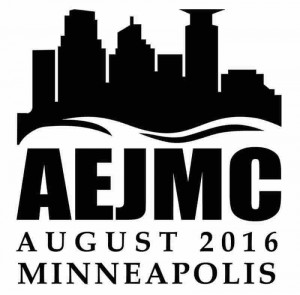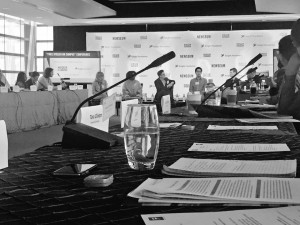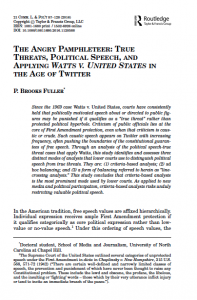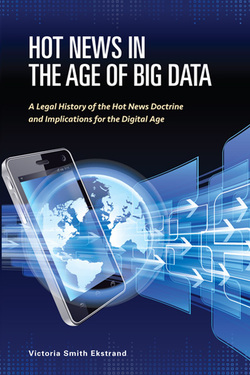 Four UNC School of Media and Journalism graduate students will present media law research papers at the Association for Education in Journalism and Mass Communication’s (AEJMC) national convention in Minneapolis Aug. 4-7. One of those students – Lindsie Trego – won a prize for writing the third best student paper in the Law and Policy Division.
Four UNC School of Media and Journalism graduate students will present media law research papers at the Association for Education in Journalism and Mass Communication’s (AEJMC) national convention in Minneapolis Aug. 4-7. One of those students – Lindsie Trego – won a prize for writing the third best student paper in the Law and Policy Division.
Congratulations, everyone!
The papers went through a process of blind review, with students and faculty competing in the same category. These are the authors’ names, paper titles, and abstracts:
Chanda Marlowe, “Student Data in Danger: What Happens When School Districts Rely on the Cloud” (Chanda is a J.D./M.A. dual degree student in the UNC School of Media and Journalism and the School of Law.)
According to Fordham Law School’s Center on Law and Information Policy’s report “Privacy and Cloud Computing in Public Schools,” 95% of public school districts rely on cloud services for a diverse range of functions. The use of cloud services raises serious privacy concerns. For example, in March of 2014, Google admitted to scanning students’ emails and gathering data that were used to target ads to those students. Under the threat of lawsuits, Google promised to stop; however, in December 2015, Google was accused of collecting and using student data for non-education purposes again, this time in violation of the Student Privacy Pledge that it signed January 2015. Yet, schools continue to contract with private sector corporations to obtain cloud services, leaving parents to wonder what information is collected on their children, how that information is being used, and how, if at all, that information is being protected. The purpose of this paper is to discuss the major privacy problems that school districts face when they rely on cloud services offered by private corporations, to analyze how FERPA and state privacy laws are addressing these problems, and to offer possible solutions that go beyond FERPA and state privacy laws. This topic is important because legislation must strike the right balance between protecting students’ personal information and meeting the technological needs of schools.
Lindsie Trego, “Indirect Censorship of Collegiate Media: Exploring Administrative Removal of Collegiate Media Advisers as First Amendment Retaliation Against Student Journalists” (Lindsie is a J.D./M.A. dual degree student in the UNC School of Media and Journalism and the School of Law. This is Lindsie’s prize-winning paper.)
Cases of indirect administrative censorship of collegiate media—in which students are indirectly punished for press activity—have recently made news headlines. In many of these cases, college media faculty advisers have been administratively removed from their positions in response to disputes between student editors and administrators. These cases call into question whether student journalists can successfully seek legal redress for indirect acts against their First Amendment rights, including removal of their advisers. Specifically, some have questioned whether removal of college media advisers injures student journalists—a necessary element of proving a First Amendment claim. This paper examines the analyses courts have used in past cases to determine what administrative actions injure students and applies these analyses to determine whether removal of college media advisers constitutes injury to student journalists in the context of First Amendment litigation.
Lindsie Trego & Chris Etheridge, “Power & Print: Content Influences in College Media” (Lindsie is a J.D./M.A. dual degree student in the UNC School of Media and Journalism and the School of Law. Chris is a Ph.D. student in the School of Media and Journalism.)
Issues of censorship in higher education have lately been common in the news, however it is unclear to what degree college newspapers experience external influences. This study examines censorship in collegiate media through in-depth interviews with student newspaper editors and advisers. Specifically, this study explores what recalled practices by external actors lead editors and advisers to perceive content pressures or lack thereof, as well as how editors and advisers respond to these pressures.
Ray Whitehouse, “An Examination of Ag-Gag and Data Trespass Statutes” (Ray is a 2016 master’s graduate of the UNC School of Media and Journalism.)
Since 1990, nine states have passed legislation that aims to limit undercover investigations of agricultural operations. These “ag-gag” laws attempt to limit investigations in three ways: by criminalizing recording and reporting on operations, criminalizing deceptive entry into operations, and by mandating that anyone recording abuse report it within a short time period. In 2015, two major events related to ag-gag laws took place. First, a federal judge ruled that Idaho’s ag-gag law was unconstitutional. This case decision, the first examining ag-gag laws, cast doubt on the constitutionality of other state ag-gag laws. Second, Wyoming passed a “data trespass” law that criminalized collecting information on “open land” with the intent to give that information to government agencies. Agricultural activists filed suit, claiming that it was an unconstitutional ag-gag law aimed at stopping citizen activists from reporting Clean Water Act violations by ranchers who lease public land from the state. Lawmakers disagreed, arguing that the bill simply strengthened existing trespass laws. This paper compares Wyoming’s data trespass law with all existing ag-gag laws and Idaho’s recently overturned law to examine its constitutionality. This examination is important because it incorporates recent legal outcomes that before now have not been incorporated into analysis of ag-gag laws. It suggests that because both the Idaho and Wyoming laws are similar in their construction and the legal questions in their respective cases are similar, the Idaho decision is very applicable to Wyoming’s data trespass law and casts serious doubts upon the constitutionality of Wyoming’s data trespass statute.




